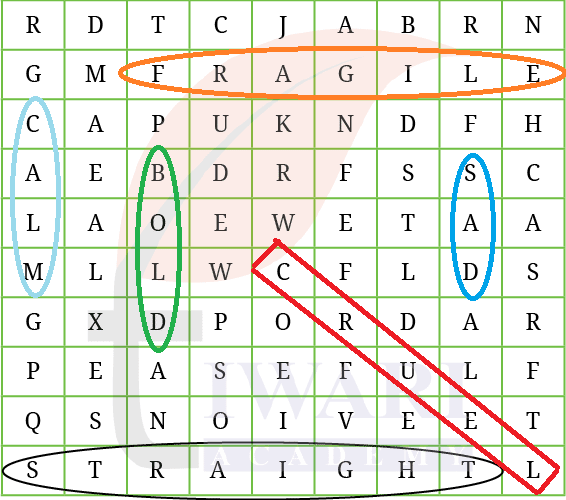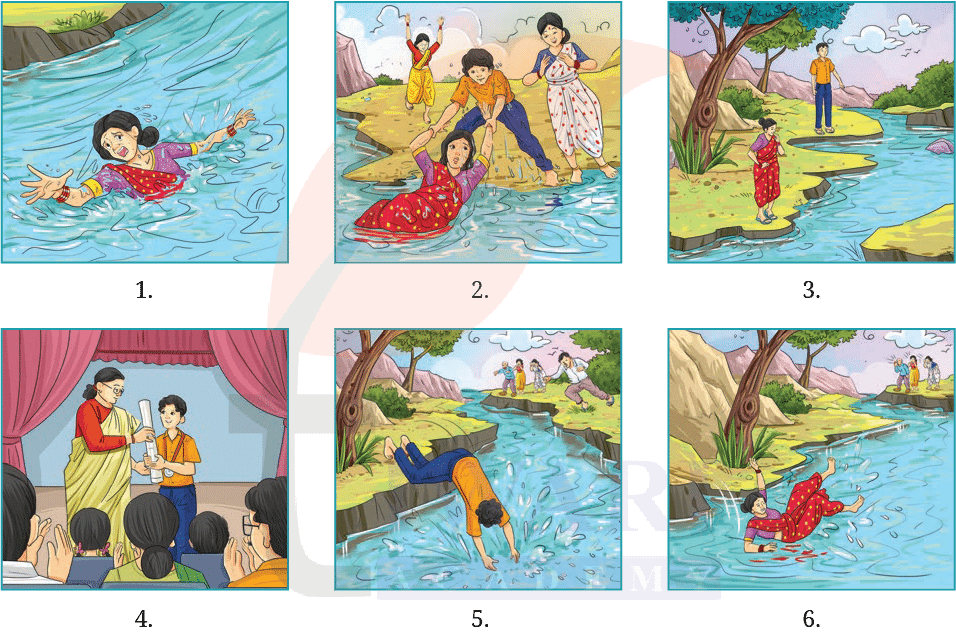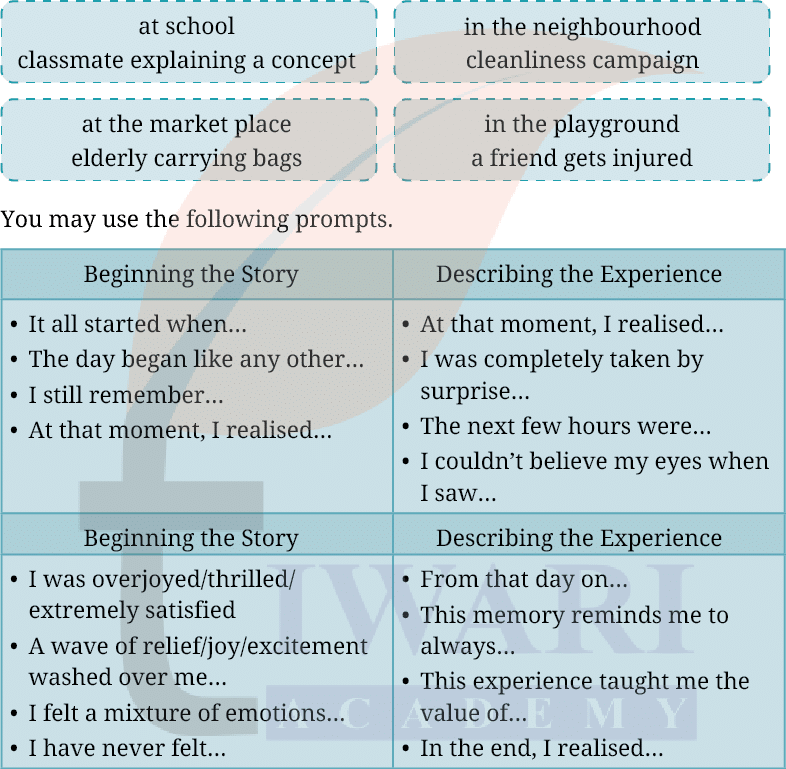NCERT Solutions for Class 8 English Poorvi Unit 2 Values and Dispositions Chapter 2 Somebody’s Mother for Session 2025-26. The poem Somebody’s Mother by Mary Dow Brine tells the touching story of an old, poor woman who stood helpless on a snowy street. Many people ignored her, but one kind boy stopped and helped her cross safely. Later, the woman prayed for the noble boy who showed her compassion. The poem highlights values of kindness, empathy and respect for the elderly. It inspires students to help others and spread humanity through small but meaningful actions.
► Class 8 English Poorvi Unit 2 Chapter 2 MCQs
► Class 8 English all Chapters Solutions
► Summary in Hindi and English
► English to Hindi Translation
Somebody’s Mother Class 8 English Poorvi Unit 2 Chapter 2 Question Answers
Page 70
Let us do these activities before we read.
I Recall a time you helped someone.
Write two words describing:
1. What were your feelings after you did so?
2. What might have been the feelings of the person whom you helped?
Share your answers with your classmates and teacher.
See AnswerOnce I helped an old man carry his heavy bag across the road.
1. My feelings after helping: Happy, Proud
2. Feelings of the person I helped: Relieved, Thankful
II Work in pairs. Read the words given below. Circle the words you would associate with an elderly person and underline the words you would associate with a school student. Share the reasons for your choices with your classmates and teacher.
strong worried trembling hastening
firm bent merry grey
slow guide helpful
See AnswerWords for an Elderly Person:
• Worried
• Trembling
• Bent
• Grey
• Slow
Because elderly people are often weak and may feel worried or nervous while doing things alone. Their body may tremble, they may have bent posture, grey hair and usually walk slowly.
Words for a School Student:
• Strong
• Hastening
• Firm
• Merry
• Guide
• Helpful
Because students are usually full of energy and strength. They are in a hurry (hastening), cheerful (merry) and firm in their steps. They can guide or help others, especially the elderly, showing their kindness.
III Read the lines.
The woman was old and ragged and grey
And bent with the chill of the Winter’s day.
Select the suitable meaning of ‘ragged’ as used in these lines. There are other four meanings given below. Discuss with your classmates and teacher.
1. (of clothes) old and torn; synonym: shabby
• a ragged jacket
2. Having an outline, an edge, or a surface that is not straight or even
• a ragged coastline
3. Not smooth or regular; not showing control or careful preparation
• I could hear the sound of his ragged breathing.
• Their performance was still very ragged.
4. (Informal) very tired, especially after physical effort
• The elderly man was ragged after climbing the stairs.
See AnswerIn the poem line “The woman was old and ragged and grey”, the word ‘ragged’ means (of clothes) old and torn; shabby.
So, the correct meaning is Option 1.
Because the poet is describing the poor old woman’s appearance on a cold winter’s day. Her clothes were old, torn and shabby, which shows her poverty and helpless condition.
Page 73
Let us discuss
I. Arrange the events of the poem in the correct order of occurrence.
Share your answers with your classmates and teacher.
1. The boy returned to his friends, feeling proud of what he had done.
2. The old woman stood alone at the crossing, hesitant to move.
3. A group of schoolboys passed by, playing, and laughing.
4. The boy offered to help the old woman cross the street.
5. The woman prayed for the boy who helped her.
6. The children hurried past the old woman without offering help.
7. The woman placed her hand on the boy’s arm, and he guided her safely across the street.
8. The boy thought about his own mother and hoped someone would help her one day.
See Answer2. The old woman stood alone at the crossing, hesitant to move.
3. A group of school boys passed by, playing, and laughing.
6. The children hurried past the old woman without offering help.
4. The boy offered to help the old woman cross the street.
7. The woman placed her hand on the boy’s arm, and he guided her safely across the street.
1. The boy returned to his friends, feeling proud of what he had done.
8. The boy thought about his own mother and hoped someone would help her one day.
5. The woman prayed for the boy who helped her.
II. Fill in the blanks by choosing the correct answer from the options given in the brackets.
1. The central theme of the poem is __________. (kindness and empathy/ adventure and courage)
2. The tone of the poem is __________. (humorous and playful/ sympathetic and hopeful)
3. The poem is written in couplets with ___________ lines in each stanza. (four/two)
4. The structure of the poem gives a rhythmic flow that reflects both the _____________. (narrative and emotions/story’s pace and message)
5. The poem follows a rhyme scheme of __________. (AABB/ABAB)
See Answer1. The central theme of the poem is kindness and empathy.
2. The tone of the poem is sympathetic and hopeful.
3. The poem is written in couplets with two lines in each stanza.
4. The structure of the poem gives a rhythmic flow that reflects both the narrative and emotions.
5. The poem follows a rhyme scheme of AABB.
III. Pick examples from the poem for the following poetic devices.
1. Simile
2. Alliteration
3. Repetition
See Answer1. Simile: Came the boys like a flock of sheep
2. Alliteration: stood at the crossing
3. Repetition: somebody’s mother
IV. Complete the following sentences appropriately explaining the imagery.
1. The poem uses imagery to describe scenes of a bustling street. We know this by the phrase ________.
2. The line ‘The street was wet with a recent snow’ suggests a cold and _________ weather, emphasising the woman’s helplessness.
See Answer1. The poem uses imagery to describe scenes of a bustling street. We know this by the phrase amid the throng of human beings who passed her by.
2. The line ‘The street was wet with a recent snow’ suggests a cold and harsh weather, emphasising the woman’s helplessness.
V. Complete the following sentence with a suitable reason.
The poet repeats the phrase Somebody’s mother because it ______________.
See AnswerThe poet repeats the phrase Somebody’s mother because it emphasizes the universal humanity and connection between all people.
VI. Complete the analogy:
The old woman: vulnerable and neglected :: The young boy:_______________.
See AnswerThe old woman: vulnerable and neglected :: The young boy: compassionate and kind.
Class 8 English Poorvi Unit 2 Chapter 2 Thinking based questions
Page 74
Let us think and reflect
I. Read the given extracts and answer the questions that follow.
1. The woman was old and ragged and grey
And bent with the chill of the Winter’s day.
The street was wet with a recent snow
And the woman’s feet were aged and slow.
(i) What does the phrase ‘ragged and grey’ refer to?
A. The woman’s emotional state that day.
B. The woman’s old and worn-out appearance.
C. The weather conditions of the particular day.
D. The colour of the street and the surroundings.
See AnswerB. The woman’s old and worn-out appearance.
Because the phrase describes her torn clothes and grey hair showing poverty and age.
(ii) Complete the following sentence with a suitable reason:
The woman was ‘bent’ with the chill of the Winter’s day because she was ______.
See AnswerThe woman was ‘bent’ with the chill of the Winter’s day because she was grateful for his ability to help.
Because his pride comes from helping, not arrogance.
(iii) Identify the fact and opinion from the following sentences:
A. The street was wet with recent snow. ______
B. The woman was too weak to cross the street on her own. ______
See AnswerFact: The street was wet with recent snow.
Opinion: The woman was too weak to cross alone.
(iv) Why do you think the woman’s feet were described as ‘aged and slow’?
See AnswerHer feet were aged and slow to show her elderly frailty and difficulty walking due to old age on slippery snow.
2. He guided the trembling feet along,
Proud that his own were firm and strong.
Then back again to his friend he went,
His young heart happy and well content.
(i) What does the contrast between the ‘trembling feet’ of the old woman and the ‘firm and strong’ feet of the boy emphasise?
See AnswerThe contrast emphasizes youth’s strength versus old age’s weakness, highlighting how the boy could assist where she struggled.
(ii) Fill in the blank given below by selecting the correct option from the brackets.
• The poem tells us that the boy was ‘proud’ that his feet were strong.
• This tells us that the boy was ______ (arrogant about being strong/grateful for his ability to help).
See AnswerThis tells us that the boy was grateful for his ability to help.
(iii) What is the boy most likely to tell his friends on getting back?
A. I’m so glad I could help her.
B. I’m worried about her safety.
C. I’m surprised she forgot to thank me.
D. I’m thankful for all your support.
See AnswerA. I’m so glad I could help her.
(iv) Rectify the false sentence given below.
The young boy’s actions were driven by a logical decision.
See AnswerFalse.
The boy’s actions were driven by compassion, not logic.
II. Answer the following questions.
1. What might be the old woman’s fears as she waited for a long time at the crossing?
See AnswerThe old woman likely feared slipping on the snowy street or being knocked down by horses and carriages. She seemed worried no one would help her cross safely. Her anxious eyes showed she felt scared and alone among the rushing crowd who ignored her struggles in the cold winter weather.
2. How does the poet show the helplessness of the old woman? Support your answer with evidence from the poem.
See AnswerThe poet shows her helplessness through descriptions like “aged and slow feet”, “trembling feet” and “meek and timid” behavior. The line “alone, uncared for amid the throng” proves nobody noticed her. Her bent posture and need for a boy’s help to cross the street clearly show her weakness and vulnerability.
3. Why does the boy decide to help the old woman? What does this tell us about him?
See AnswerThe boy helps because he imagines his own mother in her place someday. This shows he is kind, thoughtful and empathetic. Unlike others, he notices her difficulty and acts responsibly. His wish that someone might help his mother in future reveals his caring nature and good upbringing.
4. How was the boy’s approach towards the old woman different from that of the other boys in the group?
See AnswerWhile other boys laughed and rushed past the woman, this boy stopped to help. His approach was kind and patient as he whispered politely and guided her slowly. The contrast shows he was more observant, compassionate and mature than his friends who were busy playing.
5. Justify the appropriateness of the title of the poem.
See AnswerThe title “Somebody’s Mother” is appropriate because the poem teaches that every elderly person is someone’s beloved family member. The boy realizes this when he says “she’s somebody’s mother” and hopes others would similarly help his mother if needed, making the title meaningful and thought-provoking.
6. What does the poem suggest about the role of empathy and humanity in society?
See AnswerThe poem suggests that society needs more empathy and humanity. It shows how most people ignore those in need, but one kind act can make a big difference. The boy’s small gesture of help and the woman’s grateful prayer show how compassion connects people and makes the world better.
Page 78
Let us learn
I. The grid given below has the antonyms of the words from the text. Locate these words in the grid horizontally, vertically and diagonally. One example has been done for you. You may refer to a dictionary.
firm, meek, merry, kind, anxious, bent

See AnswerAntonyms of the words from the poem:
firm → fragile
meek → bold
merry → sad
kind → cruel
anxious → calm
bent → straight

II. Match the words from the text given in Column 1 with the underlined phrases in Column 2.
| Column 1 | Column 2 |
|---|---|
| 1. hastened | (i) The mother heard the baby move slightly in the cradle at night. |
| 2. heeded | (ii) It is our duty to give support to the poor. |
| 3. stir | (iii) The students worked quickly to complete the project and submit it on time. |
| 4. lend | (iv) All the boxes were kept in a heap at one place. |
| 5. piled | (v) They came forward to help us when we were in need. |
| 6. offered | (vi) The stranded people were brought to safety because they paid attention to our advice. |
Answer:
| Column 1 | Column 2 |
|---|---|
| 1. hastened | (iii) The students worked quickly to complete the project and submit it on time. |
| 2. heeded | (vi) The stranded people were brought to safety because they paid attention to our advice. |
| 3. stir | (i) The mother heard the baby move slightly in the cradle at night. |
| 4. lend | (ii) It is our duty to give support to the poor. |
| 5. piled | (iv) All the boxes were kept in a heap at one place. |
| 6. offered | (v) They came forward to help us when we were in need. |
III. In the poem, the poet uses the idiom ‘lend a hand’ which means ‘help somebody’. Some more idioms using ‘hand’ are given in Column 1. Match these idioms with their meaning in Column 2. You may refer to a dictionary.
| Column 1 | Column 2 |
|---|---|
| 1. get out of hand | (i) do something new |
| 2. try your hand at something | (ii) applaud somebody |
| 3. give somebody a free hand | (iii) work together |
| 4. give somebody a big hand | (iv) become difficult to control |
| 5. work hand in hand | (v) be very busy |
| 6. have your hands full | (vi) allow somebody to do something with full freedom |
Answer:
| Column 1 | Column 2 |
|---|---|
| 1. get out of hand | (iv) become difficult to control |
| 2. try your hand at something | (i) do something new |
| 3. give somebody a free hand | (vi) allow somebody to do something with full freedom |
| 4. give somebody a big hand | (ii) applaud somebody |
| 5. work hand in hand | (iii) work together |
| 6. have your hands full | (v) be very busy |
IV. Complete the following analogy by filling in the blanks with the correct words from the poem.
1. ___________ : winter :: heat : summer
2. Hurt : ___________ :: old: aged
3. Whispered : shouted :: humble : ___________
4. Eyes : ___________ :: legs : walk
5. Having a lot of money: wealthy :: densely packed people: ___________
See Answer1. cold : winter :: heat : summer
2. Hurt : harm :: old: aged
3. Whispered : shouted :: humble : proud
4. Eyes : see :: legs : walk
5. Having a lot of money: wealthy :: densely packed people: throng.
Read the lines from the poem given below.
Lest the carriage wheels or the horses’ feet
Should crowd her down in the slippery street.
‘Lest’ is a conjunction that means to prevent something bad or unpleasant from happening. To better understand its usage in a sentence, we can replace ‘lest’ with ‘just in case’.
For Example: In the sentence ‘She showed all the documents lest we doubt her‘, the word ‘lest’ can be replaced with ‘just in case’ to mean that she showed the document to prevent any doubt.
Page 78
Let us listen
I. You will listen to a woman read the special broadcast of the news. As you listen, arrange the pictures in the correct sequence of the events that took place. (Transcript on page 99)

Answer:
The correct sequence of the events:
Image 3
Image 6
Image 1
Image 5
Image 2
Image 4
II You will once again listen to the special broadcast of the news. As you listen, complete the following sentences with one to three exact words.
1. The woman was having a difficult time staying afloat due to the _____________.
2. Rohan leapt into the river to save the woman without any _____________.
3. Rohan’s act of bravery was witnessed by _____________.
4. Rohan was honoured at the Vigyan Bhawan for his incredible courage and __________.
5. Rohan proved that when it comes to saving lives, age is _____________.
See Answer1. The woman was having a difficult time staying afloat due to the fast waves.
2. Rohan leapt into the river to save the woman without any second thoughts.
3. Rohan’s act of bravery was witnessed by everyone there.
4. Rohan was honoured at the Vigyan Bhawan for his incredible courage and skills.
5. Rohan proved that when it comes to saving lives, age is just a number.
Page 79
Let us speak
I Read aloud the list of words from the poem that end in ‘-ed’. As you read, focus on the final sound of each word and place them in the appropriate columns. One example has been done for you.

Note: Adjectives that come before a noun and end with ‘-ed’ have /id/as the final sound.
See AnswerWords from the poem:
• ragged
• aged
• waited
• heeded
• offered
• paused
• guided
• whispered
/id/ sound
• ragged
• waited
• heeded
• guided
/d/ sound
• aged
• offered
• paused
/t/ sound
• whispered
II Work in pairs. Narrate an incident where you helped someone in the past. Take turns to speak and use the cue cards given below.

See AnswerIncident: Helping an elderly person at the marketplace
It all started when I went to the market with my mother last Sunday. The day began like any other, but I still remember seeing an old lady struggling to carry two heavy bags of vegetables. At that moment, I realised she needed help, so I quickly offered to carry one of the bags for her. She smiled and thanked me warmly.
The next few minutes were very special for me. I was overjoyed that such a small act brought so much relief to her. A wave of satisfaction washed over me as she blessed me and said, “May you always stay kind”.
In the end, I realised that helping others, even in small ways, makes the world a happier place. This memory reminds me to always be compassionate and helpful.
Page 79
Let us write
I Write a diary entry of a day you helped someone in need.
Remember to include the following points while writing it.
✔ Start with a sentence describing the day.
✔ Mention whom you helped.
✔ Explain the situation in which the other person needed help.
✔ Add the place and time of the day when the situation arose.
✔ Describe how you helped the other person.
✔ Describe the reaction of the person you helped.
✔ Mention how you felt during and after helping the person.
Conclude by mentioning why you would do something like this again.
You may begin like this:
26 April 20xx, Saturday 8:00 p.m.
Dear Diary,
Today, I feel was a special day…
See Answer26 April 20xx, Saturday 8:00 p.m.
Dear Diary,
Today, I feel was a special day. In the afternoon, while returning from the market, I saw an old man trying to cross the busy road near the bus stop. It was around 4 p.m., and the traffic was heavy. He looked worried and weak, and nobody was stopping to help him.
I immediately rushed towards him and held his hand. I guided him carefully across the road and made sure he reached the other side safely. The old man gave me a big smile and blessed me with kind words.
I felt very happy and proud after helping him. At that moment, I realised that small acts of kindness can bring big changes in someone’s life. I would surely do something like this again because it not only helps others but also fills my heart with joy.
Good Night, Diary!
Page 80
Let us explore
I. Did you know that even Earth has been referred to as mother in the ancient scriptures of India? In section 12.1.12 of Pṛthvi-Sūkta (hymn-tothe-earth) of Atharva Veda, Earth is referred to as mother and us as her children by stating:
माता भूमिः पुत्रोऽहं पृथिव्याः।
It can be translated as ‘Earth is my mother and I am her child’.
See AnswerIn the Atharva Veda, Pṛthvi-Sūkta (Hymn to the Earth), section 12.1.12, the Earth is lovingly described as a mother:
माता भूमिः पुत्रोऽहं पृथिव्याः।
This means: “The Earth is my mother, and I am her child.”
It shows how deeply our ancestors respected nature and treated the Earth as a living mother who nurtures and sustains us. This verse inspires us to protect the environment and live in harmony with nature, just like a child would care for their mother.
II. Work in groups of four. Find out the names of countries that refer to their country as ‘motherland’ and a few others as ‘fatherland’. Share your findings with your classmates and teacher.
See AnswerCountries that say Motherland
India – We say “Bharat Mata” or “Mother India”.
Russia – Russians call their country “Rodina Mat” (Mother Russia).
Philippines – It is often referred to as “Inang Bayan” (Motherland).
Countries that say Fatherland
Germany – Traditionally referred to as “Vaterland” (Fatherland).
Netherlands – People say “Vaderland”.
South Africa – Sometimes referred to as “Vaderland” in Afrikaans.
Because some nations think of the country as a mother because she nourishes and protects her children. Others think of it as a father because he symbolizes strength, protection and authority.
III Read the poem and enjoy.
A Nation’s Strength
Not gold, but only men can make
A people great and strong…
Men who for truth and honour’s sake
Stand fast and suffer long.
Brave men who work while others sleep,
Who dare while others fly…
They build a nation’s pillars deep
And lift them to the sky.
Ralph Waldo Emerson
Class 8 English Poorvi Unit 2 Chapter 2 Somebody’s Mother English to Hindi Translation
Class 8 English Poorvi Unit 2 Chapter 2 Hindi Translation
Hindi Translationबूढ़ी औरत थी और झुर्रियों तथा सफ़ेद बालों वाली
और सर्दियों के दिन की ठंड से झुकी हुई।
The woman was old and ragged and grey
And bent with the chill of the Winter’s day.
Hindi Translationहाल की बर्फ़बारी से गली गीली थी
और औरत के पैर बूढ़े और धीमे थे।
The street was wet with a recent snow
And the woman’s feet were aged and slow.
Hindi Translationवह चौराहे पर खड़ी थी और बहुत देर इंतज़ार करती रही,
अकेली, अनदेखी, उस भीड़ के बीच
She stood at the crossing and waited long,
Alone, uncared for, amid the throng
Hindi Translationइंसानों की, जो उसके पास से गुज़रे
और उसकी बेचैन आँखों की नज़र पर कोई ध्यान न दिया।
Of human beings who passed her by
Nor heeded the glance of her anxious eyes.
Hindi Translationगली से, हँसते और चिल्लाते हुए,
“स्कूल छूटा” की आज़ादी में खुश,
Down the street, with laughter and shout,
Glad in the freedom of “school let out,”
Hindi Translationलड़के भेड़ों के झुंड की तरह आए,
सफ़ेद और गहरी जमी बर्फ़ का अभिवादन करते हुए।
Came the boys like a flock of sheep,
Hailing the snow piled white and deep.
Hindi Translationबूढ़ी और सफ़ेद बालों वाली औरत के पास से
बच्चे अपने रास्ते पर जल्दी से निकल गए।
Past the woman so old and grey
Hastened the children on their way.
Hindi Translationन उसकी मदद करने के लिए हाथ ही बढ़ाया —
इतनी नम्र, इतनी डरी हुई, हिलने से भी डरती हुई
Nor offered a helping hand to her —
So meek, so timid, afraid to stir
Hindi Translationकहीं गाड़ी के पहिए या घोड़ों के पैर
उसे फिसलती हुई गली में न दबा दें।
Lest the carriage wheels or the horses’ feet
Should crowd her down in the slippery street.
Hindi Translationआख़िरकार उल्लासभरी टोली में से एक आया,
सभी के सबसे ज़्यादा खुश मस्त मिज़ाज लड़के ने;
At last came one of the merry troop,
The gayest laddie of all the group;
Hindi Translationउसने उसके पास रुककर धीरे से कहा,
“अगर आप जाना चाहती हैं, तो मैं आपको पार करवा दूँगा।”
He paused beside her and whispered low,
“I’ll help you cross, if you wish to go.”
Hindi Translationउसकी बूढ़ी हुई हथेली उसकी ताकतवर जवान बांह पर रखी और इस तरह, बिना किसी चोट या नुकसान के,
Her aged hand on his strong young arm
She placed, and so, without hurt or harm,
Hindi Translationउसने काँपते पैरों को आगे बढ़ने में मार्गदर्शन दिया,
इस बात पर गर्वित कि उसके अपने पैर मजबूत और स्थिर थे।
He guided the trembling feet along,
Proud that his own were firm and strong.
Hindi Translationफिर वह वापस अपने दोस्तों के पास गया,
उसका जवान दिल खुश और पूरी तरह से संतुष्ट था।
Then back again to his friends he went,
His young heart happy and well content.
Hindi Translation“वह किसी की माँ है, लड़कों, तुम जानते हो,
भले ही वह बूढ़ी, गरीब और धीमी है”,
“She’s somebody’s mother, boys, you know,
For all she’s aged and poor and slow”,
Hindi Translation“और मुझे आशा है कि कोई नौजवान एक हाथ बढ़ाएगा
मेरी माँ की मदद करने के लिए, तुम समझते हो”,
“And I hope some fellow will lend a hand
To help my mother, you understand”,
Hindi Translation“अगर कभी वह गरीब और बूढ़ी और सफेद बालों वाली हो जाए,
जब उसका अपना प्यारा बेटा दूर हो।”
“If ever she’s poor and old and grey,
When her own dear boy is far away.”
Hindi Translationऔर “किसी की माँ” ने उस रात अपने घर में
अपना सिर नीचा झुकाया और प्रार्थना में कहा
And “somebody’s mother” bowed low her head
In her home that night, and the prayer she said
Hindi Translation“भगवान उस महान लड़के पर दया करें,
जो किसी का बेटा, और गर्व और आनंद है!”
Was “God be kind to the noble boy,
Who is somebody’s son, and pride and joy!”
Class 8 English Poorvi Unit 2 Values and Dispositions Chapter 2 Somebody’s Mother Summary in English and Hindi
Class 8 English Poorvi Unit 2 Chapter 2 Summary
The poem Somebody’s Mother by Mary Dow Brine describes a poor, old woman who stood alone on a snowy street, afraid to cross because the road was crowded and dangerous. Many people passed by without noticing her, but one kind schoolboy stopped, held her hand and helped her cross safely. At night, the woman prayed for the “noble boy” who showed her compassion. The poem teaches us kindness, empathy and respect for the elderly.
Summary in Hindiमैरी डाउ ब्राइन की कविता Somebody’s Mother एक गरीब और बूढ़ी महिला की स्थिति बताती है, जो बर्फ़ीली सड़क पर अकेली खड़ी थी और डर के कारण सड़क पार नहीं कर पा रही थी। बहुत से लोग उसके पास से गुज़र गए, लेकिन एक दयालु स्कूली लड़का रुका और उसका हाथ पकड़कर उसे सुरक्षित पार करवाया। रात को वह महिला उस “उदार लड़के” के लिए प्रार्थना करती है। कविता हमें दया, सहानुभूति और बुजुर्गों के प्रति सम्मान का संदेश देती है।


